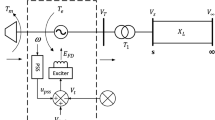Abstract
The integrated power system (IPS) is a foundation of all-electrical ships and vessels. The stability of IPS becomes a prerequisite of complicated cruise tasks. Thus, advanced stability analysis and regulation methods for IPS are of great importance. In this paper, a novel method is proposed for analyzing and enhancing transient stability of IPS, which is regarded as a cyber-physical system comprising of subsystems and connections. Criterions for determining input-output stability of such a system are firstly derived. Then, the stability analysis of IPS can be performed in the following two steps: 1) evaluating local input-output stability features of each subsystem independently through simulations. 2) Checking stability criterions with system topology and subsystem stability features. Moreover, synthetic approaches are proposed for stabilization and stability enhancement of IPS. To avoid system in-stability after major failures or topology changes, the optimal emergency control is performed to reconfigure subsystems. The other optimal regulation is used to strengthen system stability by adjusting subsystems’ control parameters during normal operation conditions. Case studies on a typical IPS validate the proposed stability analysis and enhancement approach.
Similar content being viewed by others
References
Sulligoi G, Vicenzutti A, Tironi E, et al. Naval smart grid: Integrated power system for all electric naval vessels with control and reliability characteristics. In: Proceedings of Aeit Conference from Research to Industry, Trieste, Italy, 2014, 1–6
Syberg M B. L2-Gain estimation based on multiple experiments. In: Automatic Control and Autonomic Complex Communication Networks, Signals and Systems (ACCESS), 2015, 1–9
Ma W. The integrated power system in warship. In: Proceedings of the 5th International Marine Electrotechnology Conference, Shanghai, China, 2003, 2–7
Ma W. Integrated power systems-trend of ship power development. J Naval Univ Eng, 2002, 6: 1–6
Ma W. A survey of the second-generation vessel integrated power system. In: Proceedings of the International Conference on Advanced Power System Automation and Protection, Beijing, China, 2011, 1–6
D'Agostino F. Smart management of demand in naval application: prospects and technologies for distributed control of loads, In: Proceedings of 2015 IEEE Electric Ship Technologies Symposium, Alexandria, VA, USA, 2015, 181–186
Smith A C, Williamson S, Hodge C G. High torque dense naval propulsion motors. In: Proceedings of Electric Machines and Drives Conference, 2003. IEMDC'03. IEEE International Madison, WI, USA, 2003, 1421–1427
Capasso A, Lamedica R, Prudenzi A, et al. Rotating load modeling for steady state harmonic analysis. In: Proceedings of IEEE ICHQP 96, Las Vegas, USA, 1996, 1–6
Musolino L, Piegari E T. Technical and economical evaluation of storage systems in naval applications. In: Proceedings of International Conference on Clean Electrical Power (ICCEP): Renewable Energy Resources Impact, Alghero, Italy, 2013, 120–127
Sudhoff S D. Three-dimensional stability analysis of DC Power electronics based systems. In: Proceedings of Power Electronics Specialists Conference, PESC00. IEEE 31st Annual, Galway, Ireland, 2000, 101–106
Sudhoff S D, Glover S F, Lamm P T, et al. Admittance space stability analysis of power electronic systems. IEEE Trans Aerosp Electron Syst, 2000, 36: 965–973
Bitenc B. Optimizing DC power distribution network stability using root locus analysis. In: Proceedings of the 25th International Telecommunications Energy Conference, Yokohama, Japan, 2003, 691–698
Barenthin M, Wahlberg B, Hjalmarsson H, et al. Data-driven methods for L2-gain estimation. IFAC Proc Vol, 2009, 42: 1597–1602
Mei S, Zhang X, Ma J, et al. Algorithm for local input-to-state stability analysis. IET Control Theory & Applications, 2016, 10: 1556
Liu Y L, Yu Y X. Transient stability probability of a power system incorporating a wind farm. Sci China Technol Sci, 2016, 59: 973–979
Qin B, Zhang X, Ma J, et al. Local input to state stability based stability criterion with applications to isolated power systems. IEEE Trans Power Syst, 2016, 31: 5094–5105
Holtzman J M. Nonlinear System Theory: A Functional Analysis Approach. PrenticeHall, Englewood Cliffs, N.J, 1970, 1–6
Phuong H. Stability analysis of large-scale power electronics systems. Dissertation for the Doctoral Degree. Blacksburg (VA, USA):Virginia Tech, 1994, 3–174
Rajkumar R, Lee I, Sha L. Cyber-physical systems: The next computing revolution. In: Proceedings of the 47th ACM/IEEE Design Automation Conference. Anaheim, CA, USA, 2010, 731–736
Lee E A, Seshia S A. Introduction to Embedded Systems: A Cyber- Physical Systems Approach. Cambridge (U.S.): MIT Press, 2016, 1–6
Zhao J, Wen F, Xue Y. Cyber physical power systems: Architecture, implementation techniques and challenges. Autom Electric Power Systems, 2010, 16: 1–7
Liu Y L, Yu Y X. Probabilistic steady-state and dynamic security assessment of power transmission system. Sci China Technol Sci, 2013, 56: 1198–1207
Conti S, Raiti S. Probabilistic load flow using Monte Carlo techniques for distribution networks with photovoltaic generators. Solar Energy, 2007, 81: 1473–1481
China Classification Society. Rules for Construction and Classification of Sea-going High Speed Craft. Beijing: China Classification Society, 2015. 1–7
Author information
Authors and Affiliations
Corresponding author
Rights and permissions
About this article
Cite this article
Li, F., Chen, Y., Qin, B. et al. Decomposed input-output stability analysis and enhancement of integrated power systems. Sci. China Technol. Sci. 61, 427–437 (2018). https://doi.org/10.1007/s11431-017-9118-3
Received:
Accepted:
Published:
Issue Date:
DOI: https://doi.org/10.1007/s11431-017-9118-3




